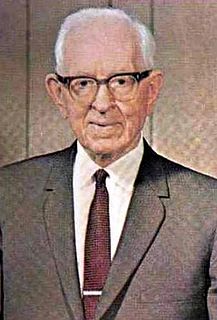A Quote by William Inge
The aim of education is the knowledge, not of facts, but of values.
Related Quotes
[The] erroneous assumption is to the effect that the aim of public education is to fill the young of the species with knowledge and awaken their intelligence, and so make them fit to discharge the duties of citizenship in an enlightened and independent manner. Nothing could be further from the truth. The aim of public education is not to spread enlightenment at all; it is simply to reduce as many individuals as possible to the same safe level, to breed and train a standardised citizenry, to put down dissent and originality.
[The scientist] believes passionately in facts, in measured facts. He believes there are no bad facts, that all facts are good facts, though they may be facts about bad things, and his intellectual satisfaction can come only from the acquisition of accurately known facts, from their organization into a body of knowledge, in which the inter-relationship of the measured facts is the dominant consideration.
Art is not and never has been subordinate to moral values. Moral values are social values; aesthetic values are human values. Morality seeks to restrain the feelings; art seeks to define them by externalizing them, by giving them significant form. Morality has only one aim - the ideal good; art has quite another aim - the objective truth... art never changes.
No longer can we afford to stuff the brains of the young with facts. The time is too short, the necessity for results too pressing. The new education must be based on the elimination of facts except as they illustrate principles. How to use facts, not how to accumulate them, is the purpose of true education.
Education has two aspects; the first is related to external and worldly education, which is nothing but acquiring bookish knowledge. In the modern world, we find many well versed and highly qualified in this aspect. The second aspect known as Educare is related to human values. The word Educare means to bring out that which is within. Human values are latent in every human being; one cannot acquire them from outside. They have to be elicited from within. Educare means to bring out human values. 'To bring out' means to translate them into action.
We do not merely give a religious education because that would seem to imply the possibility of some other education, a secular education, for example. But we hold that all education is divine, that every good gift of knowledge and insight comes from above, that the Lord the Holy Spirit is the supreme educator of mankind, and that the culmination of all education (which may at the same time be reached by a little child) is that personal knowledge of and intimacy with God in which our being finds its fullest perfection.







































